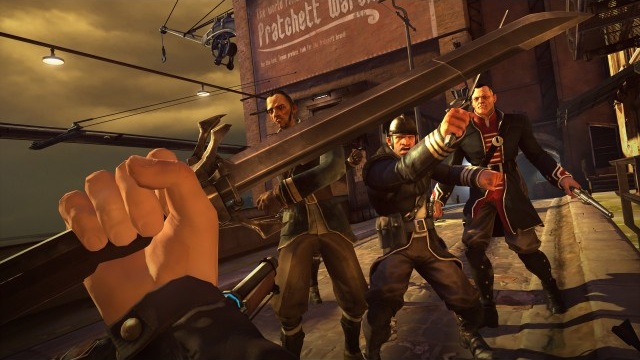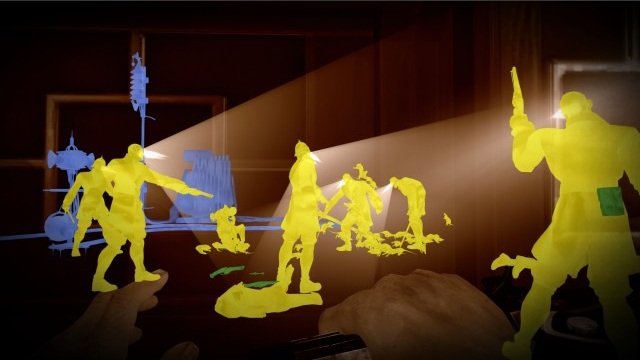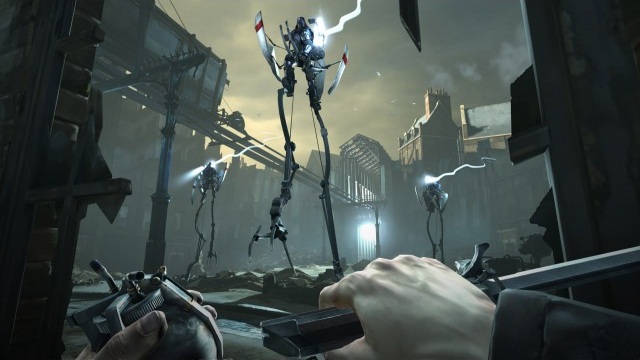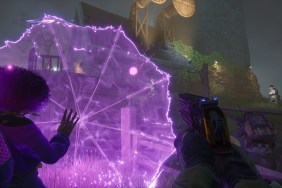Be my guest of honor.
One widely circulated benchmark in the video game industry is that a high-production original IP needs to sell more than two million copies for its developer to break even. This standard, if true, has been the downfall of countless titles, of would-be attempts at establishing that lucrative gold mine known as a franchise. No one understands this more than Curt Schilling, baseball legend and once owner of 38 Studios, who might be forced to auction off his infamous bloody sock to settle his debts after Kingdoms of Amalur: Reckoning sold under expectations despite averaging an 80 on Metacritic. The market for original IPs is high-stakes indeed, but Arkane Studios need not worry—Dishonored is a silent, deadly, sure-fire winner.
Silent protagonist Corvo, as the title implies, has been unjustly disgraced. Despite his standing as the Royal Protector of Her Majesty, Empress Jessamine Kaldwin of Dunwall, he has spent the past several weeks separated from his charge on an expedition to the various Isles in search of aid, perhaps even a cure, for the rat plague that has ravaged the kingdom's poor. It is only a matter of time before the city crumbles from within.
But in your brief return to Dunwall Tower, a well-trained squad of assassins with the unearthly power to teleport within the blink of an eye prevent Corvo from shielding the Empress and protecting her child Emily from her kidnappers. In her dying breaths, the Empress implores him to uncover the truth and rescue Emily, but within mere moments of her passing, the Lord Regent Hiram Burrows and High Overseer Thaddeus Campbell accuse Corvo of regicide. Thus, he awakens in Coldridge Prison with means, motive, and a dire need for opportunity.
Once Corvo escapes from his cell, you must make a pivotal choice: dispatch or avoid enemies with a non-lethal, stealthy approach, or decimate them with ruthless aggression. How far and how often you tip the scale in either direction silently contributes to the underlying Chaos system, which slowly but surely affects the state of Dunwall as well as Corvo's interactions with his allies and his targets. As his plan for vengeance approaches its climax, the disparity between low and high Chaos steadily reveals itself in the population of rats, citizens affected by the plague, and royal guards patrolling the streets. Not only does this radically alter the objectives and plot points for the final mission, but it also ultimately decides which ending you receive. Whichever path you choose, Dishonored never penalizes you for your actions—it merely reacts to them.
These two diverging extremes, as constricting as they could have been on the gameplay, are endpoints on a wide spectrum of options. The fluidity and flexibility between aggressive and stealthy action cannot be understated. Corvo can, at a moment's notice, switch from being a lethal badass with a pistol in one hand and a sword in the other to a silent agent who lurks in the shadows, swipes coin pouches off aristocrats, and chokes his opponents to sleep without arousing suspension. It's certainly more challenging to leave every enemy alive or to remain undetected throughout an entire mission, which is why there are Achievements/Trophies based on those objectives. That said, the normal difficulty setting is no slouch to begin with.

Supplementing Corvo's talent for murder and infiltration is a slew of supernatural powers, bestowed by a mysterious figure known as The Outsider, who looks upon him as any almighty observer would of a human being—an objectified point of interest. As Corvo collects magical runes, found with the assistance of a gruesome talking artifact vaguely known as The Heart, he can unlock up to ten powerful abilities, each of which cost mana to cast. The more combative player will focus on adrenaline kills, windblasts, and devouring rat swarms, whereas the slyer player will consider time bending, animal and human possession, and X-ray vision through walls.
This added dimension of spellcasting makes the already flexible combat system even more limber. If Corvo finds himself surrounded by thugs, he can summon a swarm of rats to distract them, slit a few throats with his sword, and then possess one of the rats for a quick escape. Or, if a guardsman foolishly decides to shoot a bullet, Corvo can effectively stop time, possess said guardsman, walk him in front of his own bullet, and well, you can figure out what happens next.
Taken altogether, Dishonored cannot be easily described or compared—an original IP that actually feels original. By a certain stretch of the imagination, to play devil's advocate, its hybridized stealth action plays similar to that of Deus Ex: Human Revolution if spellcasting replaced cybernetic implants. Shades of Arkane Studios' prior work on Bioshock 2 can be clearly seen in its use of health and mana elixirs, its combination of linear and non-linear elements, bone charms that are equivalent to passive plasmids, and audiographs that might as well be audio recordings. Corvo also has the uncanny ability to consume metal cans of food in one swift gulp.
But the stark difference in art direction, the choice of an 1800s pseudo-London whaling city that reeks with Orwellian oppression and is thoroughly submerged in thick, unnatural reds and blues, paints an unconventional yet sophisticated game world. The exaggerated features of the cel-shaded character models and the eerily blanched environments portray the bare severity of Dunwall. The Victorian-esque setting also naturally provides a canvas for rich dialogue, properly voiced by the likes of Susan Sarandon, Brad Dourif, and Carrie Fisher.

If Dishonored should harbor any criticism, it would be a matter of polish. Some of the lip-synching is off, and sometimes bodies can disappear if they are left alone for a while. Supernatural powers that have a duration such as Dark Vision and Possession would have been better with a clearly indicated time bar. The controls for climbing chains and grabbing a ledge near water can be wonky too. In addition, a small notice could have displayed whenever you fail to complete the "Didn't Kill Anyone" or "Ghost (Never Detected)" objective, instead of waiting until the end of the mission, several hours later, to find out.
As far as the story is concerned, both the introduction and epilogue could have been stretched further in establishing clearer before-and-after comparisons. The opening never shows the city of Dunwall before the descent, which would have served as a contrasting point to the effects of the plague and the oppressive measures of the Lord Regent. The closing cut-scenes are somewhat brief as well, revealing the outcome of the city with a short narration and several stiff dioramas. Several more scenes involving The Outsider, the most enigmatic character of the cast, would also have brought a better resolution to his involvement in the story. All these issues, though, are admittedly nitpicks: Dishonored's plot is still among the best of any action game to date.
Innovation in video games is coveted by many but rarely achieved—Dishonored has this in spades. It may not be perfect, but what Arkane Studios accomplishes is astounding for a debut of an original IP. Its memorable characters, striking game world, and incredible seamlessness between combat, stealth, and magic set a new standard for the action genre. Dishonored is unquestionably Game of the Year material.
-
Swift transition between action and stealth
-
...and magic too
-
Challenging, even on easy
-
Arresting art direction
-
Level design supports plenty of options
-
Rich dialogue, great voice-acting
-
Some polishing issues
-
Ending is a tad brief











